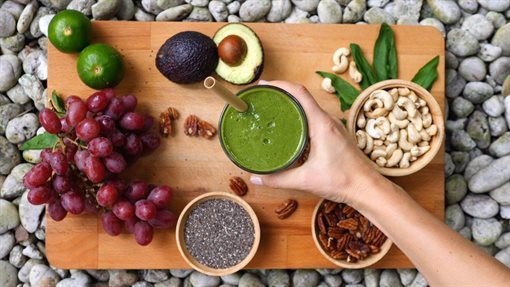
Top stories






More news

Marketing & Media
Warner Bros. was “nice to have” but not at any price, says Netflix

Logistics & Transport
Maersk reroutes sailings around Africa amid Red Sea constraints

















We’ve seen the emergence of lab-grown meat and ‘impossibly’ plant-based burgers; the rise of cauliflower pizza crusts and oat milk. From bone broth, to a hundred delicious ways with brussel sprouts - what will stay and what will go? We asked a panel of expert dietitians and ADSA (Association for Dietetics in South Africa) spokespeople to highlight some of the significant nutritional trends that are likely to shape our thinking and our food choices over the next ten years.

Celebrity culture in the USA kicked off in January 2020 with the first plant-based major awards dinner served up to the stars at the Golden Globes. This wasn’t a surprise. Globally, we’ve seen the phenomenal rise of more plant-based eating amongst the privileged who easily afford a high consumption of meat, a status symbol in our social hierarchy for millennia. SA Registered Dietitian, Kelly Scholtz says: “An affordable diet in the average SA household is already very much plant-based, with small amounts of meat, chicken or fish used when possible, with beans, peas, lentils and foods like milk and eggs providing alternative and good sources of protein. For those households with more access to expensive foods, there is also likely to be more awareness of diet and nutrition trends. It is already clear that restaurants and retailers in South Africa are stocking more meat alternatives and vegetarian and vegan products in support of this trend, which suggests that there is more demand for plant-based options from consumers.”
Another ADSA spokesperson, Cath Day, says: “In my view, every vegetable and fruit is a rock star as they all promote eating fresh and unprocessed food. They are loaded with vitamins, minerals, polyphenols and fibre; making them a nutritionally dense food option. Therefore the message, ‘eat your fruits and vegetables’, will never go out of style in the nutrition world. The new rock stars on the block, in my opinion, especially from a sustainability point of view, are the pulses. Pulses are the edible seeds of plants in the legume family. Pulses grow in pods and come in a variety of shapes, sizes and colours, and include dry beans, dry broad beans, dry peas, chickpeas, cow peas, pigeon peas and lentils. Pulses promote the health of the planet too as growing pulses promotes sustainable agriculture. Pulse crops help decrease greenhouse gases, increase soil health, and use less water than other crops. Additionally pulses are a low fat source of protein with high levels of protein and fibre. Pulses also contain important vitamins and minerals like iron, potassium and folate. Therefore, not only are they great for the earth, but they are also great for your health.”
Globally, we have already seen the rise of no-alcohol drinking options on the bottle store shelves and the popularity of new kinds of alcohol abstinence programmes on social media that highlight the improved health and happier lifestyles of teetotallers. It is a fact that global alcohol consumption has declined, and that some top alcohol producers are increasingly focused on developing non-alcoholic options. Could this become a trend in SA in the 2020’s? Registered Dietitian, Retha Harmse says, “With alcohol being a non-nutrient and high in kilojoules, a whopping 29 kilojoules per gram, it is no secret that alcohol abstinence is a good thing for your health and waistline. With the worldwide focus on moving towards healthier behaviours and habits, I do hope that alcohol consumption in the country will decrease in the new decade.”
As a consumer you can get more of what you want, just the way you want it, and when you want it. When it comes to your nutrition though, this is good if it means it’s easier for you to access healthier food and food alternatives in the case where you really need to be gluten-free or lactose-free, for example. But the drive for personalisation also includes the means for amateur self-diagnosis like never before. The internet or commercially driven apps though cannot replace the real value of professionals with scientific education and patient experience. Retha Harmse says: “Unfortunately, many people self-diagnose intolerances and implement unnecessarily restrictive diets without professional advice. Besides being a lot of trouble, dietary exclusions can be very expensive; possibly cause nutrient deficiencies; and might be the origin of an eating disorder or disguise one. Studies have also found that exclusionary diets are socially isolating.” Rather than going online or starting the latest fad diet, ask your dietitian, you will get a better, sustainable plan that takes your whole person, your medical history and lifestyle into account. Personalisation of your nutrition will be positive when you have an expert source to interpret your data based on a wide view of your lifestyle.
The least likely change to climate change is for it to become less of a headliner in the new decade. Extreme weather conditions and species extinction aside, the greatest impact of a disrupted climate will be on human food production and food availability. The world’s agricultural system as it is, depends on the stability of the earth’s climate. Kelly Scholtz says: “I think that there will be a combination of active and passive consumer behaviour change. Individuals who care about sustainability will make conscious choices, such as more plant-based eating; more careful water use; less plastic packaging and more recycling. These consumer choices prompt businesses to produce foods with sustainability in mind. This effect is already evident in many ways - for example, retailers reducing the use of plastic bags and packaging; sustainable fishing logos on certified fish products; calls for more humane treatment of animals; and commitments to using sustainable sources of palm oil. All of these actions by food manufacturers and retailers will affect even those consumers who do not make conscious choices around sustainability. There is also likely to be a passive or unavoidable change in behaviour in future, because many food products will likely become more expensive if they are not sustainably produced, or if extreme drought and other climate change makes production more challenging for farmers.”
“With the slow shift towards being more mindful and practising intuitive eating, there is immediately a weight lifted from having to be ‘perfect’ according to an impossible media ideal, and the removal of the anxiety and tension that is often associated with eating,” says Retha Harmse. “This happens when the spotlight is on eating healthy and living well because you love yourself and your body, rather than only an attempt to start loving your body. That links so perfectly with the body positive movement. I do love the body-acceptance, self-love and self-care that we see more and more, with the focus being on health rather than on weight. Remember the extremely thin 90s models? Yikes!”
Cath Day agrees wholeheartedly that we all deserve to have a positive body image, regardless of how society and popular culture view ideal shape, size, and appearance. “It is not just about challenging how society views people based upon their physical size and shape, but it also recognizes that judgments are often made based on gender, race, sexuality, and disability,” she says. “It is always vitally important to be body positive and to focus on living a healthy life which includes making sure you exercise most days, choose healthy meals and snacks, sleep enough, manage your stress, refrain from smoking and have purpose and love in your life for your social and emotional wellbeing.”
To find a dietitian in your area visit www.adsa.org.za